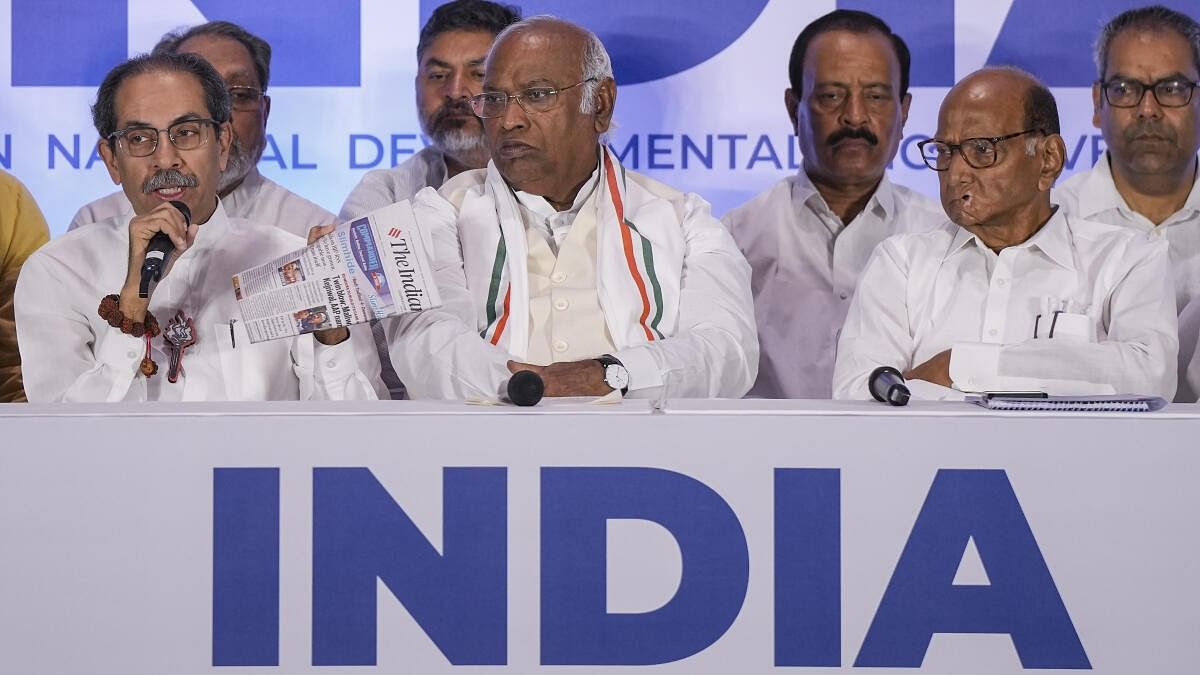
Congress president Mallikarjun Kharge (centre) with MVA partners Uddhav Thackeray (left) and Sharad Pawar (right)
Credit: PTI Photo
With elections impending in two states and a raft of by-elections also scheduled, the issue of making alliances is front and centre in the national political arena. Maharashtra will vote on November 20, while Jharkhand will do so in two phases: November 13 and 20. By-elections for many Lok Sabha constituencies and assembly constituencies will also be held. The results of all these elections will be declared on November 23.
The Assembly elections in Maharashtra are the most intriguing, because two substantial alliances are pitted against each other, and both are having problems in allocating seats to alliance partners for the 288 seats up for grabs. The Maha Yuti, comprising the Bharatiya Janata Party (BJP), the Shiv Sena, and the Nationalist Congress Party (NCP), has begun releasing lists of presumptive candidates, but that doesn’t mean that allies are not in disagreement over seats. Seat-sharing is still a project under construction.
The Maha Vikas Aghadi (MVA), constituted principally by the Congress, the NCP (Sharad Pawar) and Shiv Sena (Uddhav Balasaheb Thackeray) (SS-UBT), is also experiencing problems. We will focus on the MVA, which also includes the Samajwadi Party (SP), the Communist Party of India, the Communist Party of India (Marxist), the Peasants and Workers Party of India, and the Samajwadi Ganrajya Party.
Mixed reports have been circulating in the media about seat-sharing agreements and some of them are clearly contradictory. Some reports published on October 24 claimed for instance that it had been agreed that the three main constituents would contest 85 seats each, allocating 33 seats to the smaller allies. Elsewhere, it was claimed that the three big hitters would contest 90 seats each, allocating 18 seats to the smaller allies.
The confusion seemed to be compounded by reports that Congress leaders separately announced substantially different formulae. At one point, an announcement was made, saying the Congress would contest 104 seats, the SS-UBT 96, and the NCP-SP 88. This left no seats for the smaller partners. At one point, the SP threatened to field 25-30 candidates if its five candidates were not shown the green light by the MVA.
Nevertheless, a spirit of accommodation could be seen through this muddle. Leaders of the alliance seem to be negotiating in good faith. There are obvious areas of disagreement, some of which arise from conflicting claims made on particular seats. All parties not unexpectedly want, for example, a share of the seats in Mumbai.
In Jharkhand, too, there have been hiccups over the allocation of seats. The Jharkhand Mukti Morcha (JMM) is the senior partner in the Indian National Developmental Inclusive Alliance (I.N.D.I.A.) bloc, with the Congress a significant player. Between them they have hammered out a deal, which has caused some unhappiness in the Rashtriya Janta Dal (RJD) and the Left parties. But no insurmountable obstacle seems to be coming in the way of a smooth campaign, as JMM chief Hemant Soren has stressed.
There are too many states hosting by-elections to be treated individually. The most salient state in this context is Uttar Pradesh, where nine constituencies go to the polls — elections in one has not been announced. The SP has claimed all of them and the Congress has acquiesced to this arrangement.
West Bengal is going to see a quadrangular contest, with three I.N.D.I.A. partners flying solo — the Trinamool Congress (TMC), the Left, and the Congress. The Congress’ decision to go solo was prompted by the Left’s decision to contest all six seats up for by-elections. This could be significant because the Congress-Left rift could be a precursor to new equations, also involving the ruling TMC. The removal of Adhir Ranjan Chowdhury — a TMC baiter — in September and the appointment of Subhankar Sanyal, seen to be softer on the TMC, as Pradesh Congress Committee president, was an early sign of a realignment.
Countrywide, the I.N.D.I.A. bloc seems to have gone about the business of sharing seats pragmatically, though hitches have interrupted the process. The Congress, so crucial to a national consolidation of Opposition forces, has been largely accommodative, which is encouraging. Having let slip the opportunity to win Haryana in October, it must also learn to be more consistent in managing elections.
(Suhit K Sen is author of ‘The Paradox of Populism: The Indira Gandhi Years, 1966-1977’.)
Disclaimer: The views expressed above are the author's own. They do not necessarily reflect the views of DH.
Assembly Elections 2024 | The Maharashtra Assembly polls will take place against the backdrop of a fractured political landscape in the western state where the Shiv Sena and NCP will be going up against the Uddhav Thackeray and Sharad Pawar factions, even as the BJP and Congress try to make their mark. Meanwhile, in Jharkhand, the JMM faces a new challenge after Hemant Soren's recent arrest and Champai, a longstanding party member, joining the BJP. The Haryana election resulted in a shock loss for Congress, which was looking to galvanize on the Lok Sabha poll performance, while J&K also saw the grand old party eventually stepping away from the cabinet, with Omar Abdullah's JKNC forming government. It remains to be seen if the upcoming polls help BJP cement its position further or provide a fillip to I.N.D.I.A. Check live updates and track the latest coverage, live news, in-depth opinions, and analyses only on Deccan Herald.
Subscribe and follow DH on Whatsapp, X, Facebook, YouTube, and Instagram to never miss out on anything.